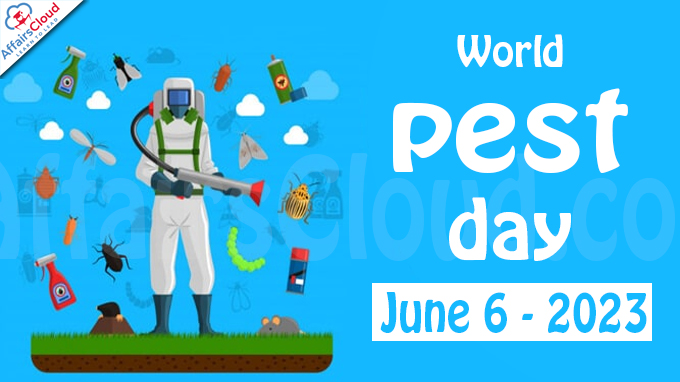
- The day also emphasises the big threats caused by small pests.
Background:
i. World Pest Day was initiated by the Chinese Pest Control Association (CPCA), and co-sponsored by the Federation of Asian and Oceania Pest Managers’ Association (FAOPMA), the National Pest Management Association (NPMA), and the Confederation of European Pest Management Associations (CEPA).
ii. The first-ever World Pest Day was observed at the Beijing Hotel, China on June 6th 2017.
Harms/ damages caused by Pests:
i. Insects are the most diverse group of animals on the planet, with an estimated 5.5 million species. More than one million have been named by scientists, and many more have yet to be discovered.
ii. While many insects can seem like pests, and are organisms that transmit disease, cause damage/harm to people, plants, animals. Various harm or health concerns caused by common pests are as follows:
iii. Cockroaches make household life very difficult and cause risks of various food contamination illnesses, allergies etc.
iv. Mosquitoes spread diseases like malaria, dengue fever, asthma, allergies and so on.
v. Termites are a major cause of damage to any property, as they usually live in the soil and eat wood, they are known for damaging wooden properties.
vi. Various rats and mice spread rodent-borne diseases, contaminate the food and also damage the home.
vii. Additionally, some insects like Spiders, Lady beetles, dragonfly families and predatory mites are natural predators to pests that may harm food crops.
Pest Management:
i. Pesticides are any substance or mixture of substances made up of chemical or biological ingredients and intended to repel, destroy or control pests, or to regulate plant growth.
ii. The Food and Agriculture Organization (FAO) of the United Nations (UN),estimates that plant pests and diseases account for the reduction of between 20 and 40% of global crop yields per year.
iii. The International Code of Conduct on Pesticide Management developed by FAO and the World Health Organization (WHO) considers all the regulatory and technical measures required in the life cycle of pesticides to ensure their safety and efficacy.
iv. FAO promotes less hazardous, alternative approaches to synthetic chemical pesticides and encourages developing countries to prioritise the identification of highly hazardous pesticides (HHPs).
v. FAO also promotes Integrated Pest Management (IPM) for sustainable crop protection and it was developed to steadily increase pesticide use in pest control crises.